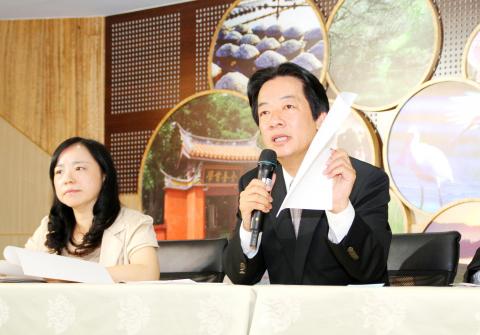The Food and Drug Administration (FDA) yesterday issued a three-day ultimatum to firms that have sold or manufactured food containing six Beei Hae Oil and Fats Co (北海油脂) lard-based products that may have been mixed with inferior oil: Pull the items off their shelves or face fines.
“Companies that have purchased the six kinds of potentially problematic Beei Hae Oil lard products are required to inform local health authorities about the quantity they procured and the food products they have made with it by 6pm on Wednesday [today],” the agency’s interim Director-General Chiang Yu-mei (姜郁美) told a news conference in Taipei.
Chiang said that in line with the Act Governing Food Safety and Sanitation (食品安全衛生管理法), the firms must pull all potentially adulterated products from store shelves by midnight on Friday or face fines ranging from NT$60,000 to NT$50 million (US$1,965 to US$1.6 million).

Photo: CNA
Chiang’s remarks came one day after the Greater Tainan Government’s Department of Health ordered a nationwide recall of the six Beei Hae Oil lard products, whose de facto owner, Lu Ching-hsieh (呂青協), has been accused by Tainan prosecutors of using 582 tonnes of inedible oils and animal feed-grade beef tallow to produce 1,275 tonnes of cooking lard.
Lu and his wife, Lu Huang Li-hua (呂黃麗華), the nominal head of Beei Hae Oil, have been held incommunicado since Oct. 18 and Oct. 30 respectively on charges of fraud and violating the act.
Chiang said Tainan’s health department is still trying to track the downstream buyers of the six questionable products, which could have been sold to food processors nationwide and came in a variety of package sizes ranging up to 180kg.
Meanwhile, Greater Tainan Mayor William Lai (賴清德) of the Democratic Progressive Party (DPP) dismissed accusations by Chinese Nationalist Party (KMT) legislators that the city’s health department had denied a request from the Tainan District Prosecutors’ Office to instigate a preventive recall of Beei Hae Oil’s lard products.
“It was the city’s health department that referred Beei Hae Oil’s case to the prosecutors’ office for investigation after it found the Tainan-based company’s business receipts to be suspicious,” Lai told a news conference in the city.
There was no mention of a recall request when the health department’s officials met with prosecutors to discuss the case on Oct. 27 and again on Monday.
“In addition, it is the mandate of the Ministry of Health and Welfare [to initiate a recall], which is why the prosecutors’ office explicitly said [in a press release yesterday] that it did not have the right to issue such a request,” Lai said.
The city government did not receive a list of Beei Hae Oil’s downstream buyers from the prosecutors until Monday, Lai said.
City health officials immediately notified the ministry and launched a nationwide recall of the suspect products as soon as they received the information, he said.
Additional reporting by CNA

A car bomb killed a senior Russian general in southern Moscow yesterday morning, the latest high-profile army figure to be blown up in a blast that came just hours after Russian and Ukrainian delegates held separate talks in Miami on a plan to end the war. Kyiv has not commented on the incident, but Russian investigators said they were probing whether the blast was “linked” to “Ukrainian special forces.” The attack was similar to other assassinations of generals and pro-war figures that have either been claimed, or are widely believed to have been orchestrated, by Ukraine. Russian Lieutenant General Fanil Sarvarov, 56, head

SAFETY FIRST: Double the number of police were deployed at the Taipei Marathon, while other cities released plans to bolster public event safety Authorities across Taiwan have stepped up security measures ahead of Christmas and New Year events, following a knife and smoke bomb attack in Taipei on Friday that left four people dead and 11 injured. In a bid to prevent potential copycat incidents, police deployments have been expanded for large gatherings, transport hubs, and other crowded public spaces, according to official statements from police and city authorities. Taipei Mayor Chiang Wan-an (蔣萬安) said the city has “comprehensively raised security readiness” in crowded areas, increased police deployments with armed officers, and intensified patrols during weekends and nighttime hours. For large-scale events, security checkpoints and explosives

PUBLIC SAFETY: The premier said that security would be tightened in transport hubs, while President Lai commended the public for their bravery The government is to deploy more police, including rapid response units, in crowded public areas to ensure a swift response to any threats, President William Lai (賴清德) said yesterday after a knife attack killed three people and injured 11 in Taipei the previous day. Lai made the remarks following a briefing by the National Police Agency on the progress of the investigation, saying that the attack underscored the importance of cooperation in public security between the central and local governments. The attack unfolded in the early evening on Friday around Taipei Main Station’s M7 exit and later near the Taipei MRT’s Zhongshan

REBUFFED: In response to Chinese criticism over recent arms sales, Washington urged Beijing to engage in meaningful dialogue instead of threats and intimidation Washington’s long-term commitment to Taiwan would not change, the US Department of State said yesterday, urging Beijing to stop pressuring Taiwan and engage in meaningful bilateral dialogues. The remarks came in response to a backlash from Beijing about Washington’s latest approval of arms sales to Taiwan. The US Defense Security Cooperation Agency said in a statement on Wednesday that the Taipei Economic and Cultural Representative Office in the US has asked to purchase an arms package, including Tactical Mission Network Software; AH-1W helicopter spare and repair parts; M109A7 self-propelled howitzers; HIMARS long range precision strike systems; tube-launched, optically tracked, wire-guided missiles; Javelin